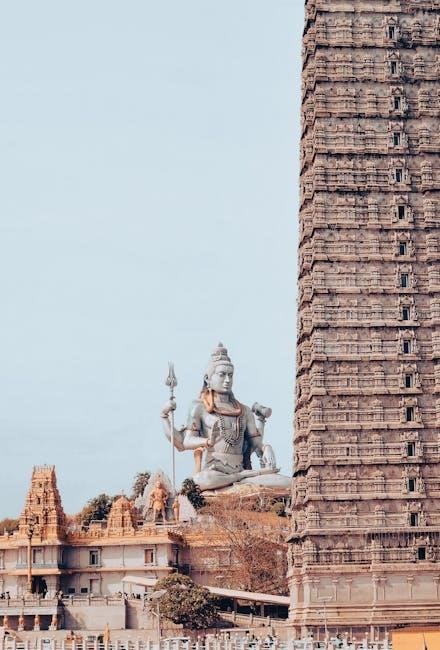1.1 What is Shiva Ashtothram?
Shiva Ashtothram is a sacred Hindu prayer consisting of 108 names of Lord Shiva, symbolizing his divine attributes and reverence. It is a powerful devotional tool for worshipers.
Shiva Ashtothram, or Ashtottara Shatanamavali, is a revered Hindu devotional prayer dedicated to Lord Shiva, comprising 108 sacred names that extol his divine virtues and attributes. Each name embodies a unique aspect of Shiva’s personality, from his cosmic role as the destroyer to his benevolent qualities as a protector and benefactor. The prayer is deeply rooted in Hindu spirituality, offering a pathway to connect with the divine through chanting. In Telugu, the Shiva Ashtothram PDF is widely sought after, providing devotees with an accessible format to recite and meditate on these powerful names. It serves as a tool for spiritual growth, fostering devotion and inner peace among followers.
1.2 Significance of Shiva Ashtothram in Hinduism
Shiva Ashtothram holds immense spiritual significance in Hinduism, serving as a devotional pathway to connect with Lord Shiva. The 108 names encapsulate his divine attributes, reflecting his cosmic role as destroyer, protector, and benefactor. Each name carries profound philosophical and spiritual meaning, offering devotees a deeper understanding of his essence. In Hindu tradition, reciting these names is believed to confer blessings, peace, and liberation. The Telugu PDF version of Shiva Ashtothram has become a popular resource, enabling widespread accessibility and fostering devotion among Telugu-speaking communities. It is often recited during rituals, festivals, and personal worship, symbolizing a heartfelt surrender to Shiva’s divine grace.
1.3 Overview of the 108 Names of Lord Shiva
The 108 names of Lord Shiva, as detailed in the Shiva Ashtothram, represent his divine attributes, roles, and cosmic significance. Each name highlights a unique aspect of his personality, such as destroyer, protector, and benefactor. These names are not merely titles but carry deep spiritual and philosophical meanings, reflecting Shiva’s universal influence. The Telugu PDF version of Shiva Ashtothram presents these names in a structured format, making them accessible for recitation and meditation. The names range from “Shiva” to “Maheshwara,” symbolizing his transcendental and immanent forms. This compilation is revered for its ability to connect devotees with Shiva’s divine energy, fostering spiritual growth and devotion.
Historical Background of Shiva Ashtothram
Shiva Ashtothram traces its roots to ancient Hindu scriptures, evolving as a key devotional text in Vedic and Puranic traditions, reflecting Shiva’s enduring spiritual significance.
2.1 Origin and Evolution of the Prayer
Shiva Ashtothram, a prayer consisting of 108 names of Lord Shiva, traces its origin to ancient Hindu scriptures, including Vedic and Puranic texts. It evolved as a significant devotional hymn, reflecting Shiva’s divine attributes and cosmic roles. The prayer’s structure and content are deeply rooted in Vedic traditions, emphasizing reverence and spiritual connection. Over time, it has been adapted into various regional languages, including Telugu, to make it accessible to a broader audience. Its evolution highlights the enduring significance of Shiva worship in Hinduism, blending philosophical insights with devotional practices. This sacred hymn remains a cornerstone of Shiva devotion, fostering spiritual growth and faith.
2.2 Role of Shiva Ashtothram in Ancient Hindu Scriptures
Shiva Ashtothram holds a revered position in ancient Hindu scriptures, including the Vedas and Puranas, which extol Lord Shiva’s divine virtues; The prayer is deeply embedded in Vedic rituals and spiritual practices, reflecting Shiva’s cosmic significance. Ancient texts highlight its use in worship, emphasizing its ability to connect devotees with the divine. The 108 names encapsulate Shiva’s multifaceted nature, making it a cornerstone of devotional literature. Its inclusion in scriptures underscores its role in fostering spiritual growth and maintaining harmony. This sacred hymn continues to be a vital part of Hindu religious practices, bridging the gap between ancient traditions and modern spirituality.
2.3 Influence of Shiva Ashtothram on Devotional Practices
Shiva Ashtothram has profoundly influenced devotional practices, serving as a cornerstone for worship in Hindu tradition. Its recitation is integral to rituals, fostering a deep emotional and spiritual connection with Lord Shiva. The prayer’s rhythmic chanting creates a meditative atmosphere, enhancing focus and devotion. It is often recited during auspicious occasions and poojas, symbolizing surrender and reverence. The 108 names encapsulate Shiva’s benevolent and powerful attributes, inspiring devotees to embrace his teachings. This sacred hymn has also influenced community practices, with group chants fostering unity and shared spirituality. Its availability in Telugu PDF has further expanded its reach, making it accessible for devotees to incorporate into daily worship and maintain a strong spiritual practice.
Structure and Content of Shiva Ashtothram
Shiva Ashtothram contains 108 divine names of Lord Shiva, each reflecting his attributes. The structured prayer includes invocations, verses, and rhythmic chants, enhancing its spiritual impact. Available in Telugu PDF for easy access.
3.1 The 108 Names of Lord Shiva Explained
The 108 names of Lord Shiva in the Shiva Ashtothram are sacred invocations, each representing his divine attributes and cosmic roles. These names, such as “Shiva,” “Maheshwara,” and “Shambhu,” symbolize his benevolence, power, and transcendence. The Telugu PDF version meticulously lists these names, preserving their spiritual significance. Each name is a mantra, offering devotees a deeper connection to Shiva’s essence. The sequence of names reflects his multifaceted nature, from destroyer to protector, emphasizing his universal relevance. The Telugu rendition ensures accessibility for Telugu-speaking devotees, maintaining the prayer’s rhythmic and spiritual integrity. This structured compilation is a revered tool for worship, enabling followers to seek blessings and enlightenment through recitation.
3.2 Meanings and Interpretations of Key Names
The 108 names of Lord Shiva in the Telugu PDF are rich in spiritual significance, each representing a unique aspect of his divine nature. Names like “Shiva” signify his auspicious presence, while “Maheshwara” highlights his supremacy as the universe’s ruler. “Shambhu” reflects his benevolent form, and “Pinakin” underscores his role as the protector. The Telugu version meticulously translates these names, preserving their philosophical depth. For instance, “Kapardin” symbolizes his ascetic form with matted locks, embodying spiritual detachment. Each name serves as a mantra, connecting devotees to Shiva’s cosmic essence. The interpretations emphasize his dual role as destroyer and preserver, reinforcing his timeless relevance in Hindu spirituality.
3.3 Rhythmic and Spiritual Significance of the Chant
The rhythmic chanting of Shiva Ashtothram holds profound spiritual significance, creating a meditative atmosphere that connects devotees to the divine. The melodic cadence of the Telugu version enhances its emotional resonance, allowing worshipers to immerse themselves in devotion. Each syllable and name is believed to carry vibrational energy, purifying the mind and soul. The chant’s rhythm aligns with the heartbeat, fostering inner harmony and focus. Spiritually, it is said to invoke Lord Shiva’s blessings, offering solace, strength, and enlightenment. Regular chanting is believed to cleanse past karmas and bring peace, making it a powerful practice for spiritual growth and self-realization.

Benefits of Chanting Shiva Ashtothram
Chanting Shiva Ashtothram brings spiritual enlightenment, inner peace, and material success. It wards off negative energies, enhances mental clarity, and fosters devotion, leading to a balanced life.
4.1 Spiritual Benefits and Inner Peace
Chanting Shiva Ashtothram in Telugu PDF offers profound spiritual benefits, fostering inner peace and emotional balance. It helps devotees connect deeply with Lord Shiva, symbolizing divine consciousness and liberation; The rhythmic recitation calms the mind, reducing stress and anxiety, while its sacred vibrations purify the soul. Regular chanting enhances mental clarity, strengthens faith, and cultivates a sense of detachment and self-realization. It is believed to mitigate past karmic influences and bring harmony to one’s life. The prayer’s spiritual energy also aids in introspection and self-refinement, guiding seekers toward a path of righteousness and eternal bliss. Thus, Shiva Ashtothram serves as a powerful tool for spiritual growth and inner tranquility.
4.2 Material and Emotional Benefits of Reciting the Prayer
Reciting Shiva Ashtothram in Telugu PDF is believed to bring material prosperity and emotional well-being. It is said to attract positive energies, fostering happiness and success in life. Devotees often experience emotional stability, as the prayer helps alleviate stress and anxiety. Chanting the 108 names of Lord Shiva is also thought to strengthen relationships and resolve conflicts, promoting harmony in personal and professional spheres. Additionally, it is believed to ward off financial difficulties and obstacles, bestowing blessings for a stable and prosperous life. The emotional solace derived from the prayer further enhances one’s ability to cope with life’s challenges, fostering resilience and gratitude.
4.3 Role in Warding Off Negative Energies
Shiva Ashtothram is deeply revered for its ability to ward off negative energies and bring spiritual protection. Chanting the 108 names of Lord Shiva is believed to create a protective shield around the reciter, dispelling adverse influences and misfortunes. The prayer is often recited in times of turmoil or uncertainty to seek divine intervention and restore balance. Its rhythmic chanting is thought to purify the environment, driving away evil spirits and harmful vibrations. Many devotees believe that regular recitation of Shiva Ashtothram strengthens their aura, safeguarding them from negative energies and attracting positive forces. This makes it a powerful tool for spiritual defense and harmony.

Shiva Ashtothram in Telugu
Shiva Ashtothram in Telugu is a revered devotional text, offering 108 sacred names of Lord Shiva. The Telugu PDF version is widely available, featuring clear formatting and transliteration for easy chanting, making it accessible to Telugu-speaking devotees worldwide.
5.1 Availability of Shiva Ashtothram in Telugu PDF
The Shiva Ashtothram in Telugu PDF is widely available online, offering easy access to devotees. Websites like Vignanam.org and Stotranidhi provide downloadable versions, ensuring convenience for spiritual practices. These PDFs are meticulously formatted, featuring clear Telugu text, making it easy for devotees to recite and understand the 108 names of Lord Shiva. Additionally, many platforms offer free downloads, catering to the growing demand for digital spiritual resources. The PDFs are often accompanied by transliterations and meanings, enhancing the worship experience. This accessibility has made the Shiva Ashtothram a popular choice for daily worship and special rituals among Telugu-speaking communities.
5.2 Key Features of the Telugu Version
The Telugu version of Shiva Ashtothram PDF is rich in features that enhance devotional practices. It includes the 108 names of Lord Shiva in clear Telugu script, along with their transliterations for easy pronunciation. The PDF often incorporates meanings of each name, providing spiritual insights. Additionally, some versions feature rhythmic notations, enabling devotees to chant melodiously. The layout is user-friendly, with proper formatting for readability. Many PDFs are free to download, making them accessible to a wide audience. These features collectively make the Telugu Shiva Ashtothram PDF a comprehensive tool for worship, blending tradition with modern convenience to aid in meaningful spiritual practices.
5.3 Differences from Other Regional Versions
The Telugu version of Shiva Ashtothram PDF stands out for its linguistic and cultural nuances. Unlike versions in Tamil or Malayalam, Telugu PDFs often include transliterations and meanings, making it accessible to non-Telugu speakers. The Telugu script’s unique calligraphy enhances readability. Additionally, Telugu versions frequently incorporate regional hymns and verses, reflecting local traditions. The emphasis on rhythm and meter in Telugu chanting is also highlighted in these PDFs. These distinctions make the Telugu Shiva Ashtothram a blend of linguistic heritage and spiritual devotion, catering specifically to Telugu-speaking communities while maintaining the essence of the prayer.

How to Use the Shiva Ashtothram PDF
Download the PDF from trusted sources, access it via devices, and recite with devotion. Use it in daily rituals, chanting with focus and understanding the divine meanings.
6.1 Steps to Download and Access the PDF
To download the Shiva Ashtothram PDF in Telugu, visit trusted websites like Vignanam.org or Stotranidhi. Use the search bar to find “Shiva Ashtothram Telugu PDF.” Click on the link, and follow the download instructions. Once downloaded, open the PDF using a PDF reader on your device. Ensure your device supports Telugu font for proper viewing. The PDF is compatible with smartphones, tablets, and computers, making it accessible for daily chanting. Print the PDF if desired for offline use. The document typically includes all 108 names with clear Telugu script, enabling easy recitation and spiritual focus.
6.2 Tips for Effective Chanting Using the PDF
For effective chanting of Shiva Ashtothram using the Telugu PDF, ensure a quiet and peaceful environment. Begin with a calm mind and offer prayers to Lord Shiva. Use the PDF to read the names clearly, focusing on pronunciation. Understand the meaning of each name to enhance devotion. Chant slowly, allowing the spiritual energy to resonate within. Regular practice fosters concentration and emotional connection. Print the PDF for offline access or use it digitally on smartphones or tablets. Set aside a specific time daily for chanting, ideally during early morning or evening. This discipline strengthens spiritual growth and inner peace.
6.3 Incorporating the PDF into Daily Worship
Incorporating the Shiva Ashtothram PDF into daily worship enhances spiritual practice. Begin by setting a specific time, such as early morning or evening, for chanting. Use the PDF on smartphones or tablets for convenience. Create a sacred space by lighting a lamp or incense to foster a devotional atmosphere. Chant each name slowly, reflecting on its meaning to deepen connection. For offline access, print the PDF or save it on devices. Regular recitation strengthens faith and discipline. Share the PDF with family or friends to collectively benefit from its divine energy. Consistency in worship using the PDF cultivates inner peace and spiritual growth, making it a meaningful part of daily rituals.
Popular Websites for Shiva Ashtothram PDF
Popular websites offering Shiva Ashtothram PDF include Vignanam.org, Stotranidhi, and other trusted sources. These sites provide easy access to the Telugu version for devotees worldwide.
7.1 Vignanam.org and Its Resources
Vignanam.org is a trusted platform offering the Shiva Ashtothram PDF in Telugu. It provides a clean, user-friendly interface for downloading the document. The site regularly updates its resources to ensure accessibility and quality. Devotees can easily navigate and download the PDF version of the prayer, which includes all 108 names of Lord Shiva. Additionally, Vignanam.org offers other spiritual resources, making it a comprehensive destination for religious texts. Its reliability and ease of use make it a popular choice among Telugu-speaking devotees seeking authentic spiritual content.
7.2 Stotranidhi and Its Contributions
Stotranidhi is a dedicated platform offering Hindu spiritual content, including the Shiva Ashtothram in Telugu PDF. It provides authentic, well-structured documents for devotees. The site’s mobile-friendly design ensures easy access, making it a favorite among users. Stotranidhi also features Stotrams by revered composers and guides for daily puja, enhancing its value as a comprehensive spiritual resource.
7.3 Other Trusted Sources for the PDF
Besides Vignanam.org and Stotranidhi, other reliable sources for Shiva Ashtothram in Telugu PDF include Hindupedia and TemplePurohit. These platforms provide authentic, downloadable versions of the prayer, ensuring accessibility for devotees worldwide. Additionally, websites like Google Drive and regional temple sites often host Shiva Ashtothram PDFs, catering to diverse spiritual needs. These sources are known for their accuracy and user-friendly formats, making them popular among those seeking high-quality devotional content. They ensure that the sacred hymn reaches a broader audience, preserving its cultural and religious significance. These platforms are trusted for their dedication to maintaining the purity of Hindu scriptures and chants.
Cultural and Religious Significance
Shiva Ashtothram holds deep cultural and religious significance, especially in Telugu-speaking communities. It is integral to rituals, festivals, and daily worship, fostering devotion and spiritual well-being.
8.1 Role in Telugu-Speaking Communities
Shiva Ashtothram holds a revered place in Telugu-speaking communities, serving as a cornerstone of spiritual and cultural practices. It is often recited during pujas, festivals, and daily worship, fostering a deep connection with Lord Shiva. The availability of Shiva Ashtothram in Telugu PDF has made it easily accessible, enabling devotees to chant the 108 names with ease. This prayer is particularly significant during Maha Shivaratri, where it is chanted collectively in temples and homes, strengthening communal bonds. Its rhythmic recitation and profound meanings resonate deeply, making it a unifying force in Telugu-speaking regions, bridging the gap between devotion and cultural heritage.
8.2 Celebrations and Rituals Involving Shiva Ashtothram
Shiva Ashtothram is deeply integrated into various celebrations and rituals, particularly in Telugu-speaking regions. During Maha Shivaratri, devotees chant the 108 names of Lord Shiva from the Telugu PDF, often in collective recitals at temples and homes. The prayer is also an essential part of lingam worship, where devotees offer flowers, milk, and prayers, accompanied by the chanting of Shiva Ashtothram. Rituals like Rudra Abhishekam and Shiva Puja often include this prayer to invoke divine blessings. Additionally, community recitals during festivals strengthen spiritual bonds and foster devotion. The Telugu PDF version has made it easier for people to participate in these rituals, ensuring the tradition remains vibrant and accessible.
8.3 Influence on Telugu Literature and Music
Shiva Ashtothram has profoundly influenced Telugu literature and music, inspiring devotional works that celebrate Lord Shiva. Traditional Telugu poets often drew inspiration from the 108 names, incorporating them into hymns and verses. In music, the prayer is rendered as melodious keertans, blending spirituality with art. The rhythmic structure of Shiva Ashtothram makes it a favorite for composers, who create soulful renditions that resonate with devotees. Telugu literature and music continue to thrive, enriched by the spiritual essence of Shiva Ashtothram, making it a cornerstone of cultural expression in the region. Its availability in Telugu PDF has further facilitated its use in literary and musical compositions, ensuring its timeless appeal.

Verses and Their Meanings
The verses of Shiva Ashtothram in Telugu PDF reveal profound spiritual insights, with each name reflecting Lord Shiva’s divine attributes, offering devotees a deeper understanding of his cosmic essence.
9.1 Analysis of Select Verses from Shiva Ashtothram
Selected verses from Shiva Ashtothram highlight Lord Shiva’s divine attributes. For instance, “ఓ శివాయ నమ” signifies devotion to Shiva, while “ఓ మహేశ్వరాయ నమ” praises his sovereignty. These verses embody spiritual essence, reflecting Shiva’s role in creation, preservation, and destruction. The Telugu rendition preserves the hymn’s rhythmic beauty, making it accessible for regional devotees. Each name carries profound meaning, offering insights into Shiva’s cosmic significance and his grace. Chanting these verses is believed to bring inner peace, spiritual clarity, and a deeper connection to the divine. Their analysis reveals the rich philosophical and cultural heritage embedded in Shiva Ashtothram, making it a timeless devotional treasure.
9.2 Spiritual and Philosophical Insights
Shiva Ashtothram offers profound spiritual and philosophical insights into Lord Shiva’s divine nature. Each name in the hymn reflects his attributes, such as destroyer, preserver, and transformer of the universe. The prayer embodies the duality of Shiva’s fierce and benevolent forms, symbolizing balance in cosmic order. It underscores the essence of devotion, self-realization, and liberation. The Telugu version retains these deeper meanings, making it a bridge between regional culture and universal spirituality. Chanting the Ashtothram is believed to purify the soul, fostering inner harmony and a connection to the divine. Its philosophical depth inspires seekers to embrace both the mysteries and tranquility of existence, aligning with Hinduism’s broader metaphysical truths.
9.3 Relevance in Modern Life
Shiva Ashtothram remains highly relevant in modern life, offering spiritual solace and guidance amidst chaos. Its teachings on detachment, balance, and self-realization resonate with contemporary seekers. The prayer’s emphasis on inner peace and harmony aligns with modern wellness trends, providing a holistic approach to mental and emotional well-being. The availability of the Telugu PDF version ensures accessibility, allowing devotees to chant and reflect digitally. It bridges tradition and technology, preserving ancient wisdom for new generations. The philosophical insights into life’s purpose and cosmic order inspire personal growth and resilience. Thus, Shiva Ashtothram continues to be a timeless resource for spiritual and emotional enrichment in today’s fast-paced world.
Shiva Ashtothram in Telugu PDF is a vital resource, offering spiritual growth, emotional balance, and divine connection. It remains a timeless guide for modern devotees seeking tranquility and inspiration.
10.1 Summary of Key Points
Shiva Ashtothram in Telugu PDF is a revered devotional resource, offering the 108 names of Lord Shiva in a culturally significant format. It highlights the spiritual and emotional benefits of chanting, such as inner peace and prosperity. The PDF is widely available on trusted platforms like Vignanam.org and Stotranidhi, ensuring accessibility for Telugu-speaking devotees. Its structure includes meaningful verses, rhythmic chants, and interpretations, making it a comprehensive guide for worship. The Telugu version retains the essence of the original prayer while catering to regional linguistic preferences. It serves as a valuable tool for daily rituals, fostering a deeper connection with Lord Shiva and promoting spiritual growth.
10.2 Final Thoughts on the Importance of Shiva Ashtothram
Shiva Ashtothram holds profound significance as a devotional practice, offering spiritual enlightenment and emotional solace. Its 108 names encapsulate Lord Shiva’s divine attributes, making it a powerful tool for worship. The Telugu PDF version bridges cultural and linguistic gaps, ensuring accessibility for Telugu-speaking devotees. By chanting these verses, one can attain inner peace, prosperity, and protection from negativity. The prayer’s rhythmic and spiritual essence fosters a deeper connection with the divine, enriching both personal and communal worship experiences. Embracing Shiva Ashtothram is a meaningful way to honor Lord Shiva and embody the values of devotion, humility, and spiritual growth in daily life.
10.3 Encouragement to Explore and Chant the Prayer
Exploring and chanting Shiva Ashtothram is a rewarding spiritual journey that fosters deep devotion and inner peace. The Telugu PDF version makes it accessible to all, ensuring ease of recitation. By incorporating this prayer into daily worship, one can experience profound emotional and spiritual benefits. Chanting the 108 names of Lord Shiva helps in seeking blessings, overcoming challenges, and connecting with the divine. It is a powerful tool for personal growth, fostering humility and gratitude. Embrace this sacred tradition and allow its rhythmic beauty to enrich your spiritual life. Start your journey today and let the grace of Lord Shiva guide you toward a path of harmony and enlightenment.
